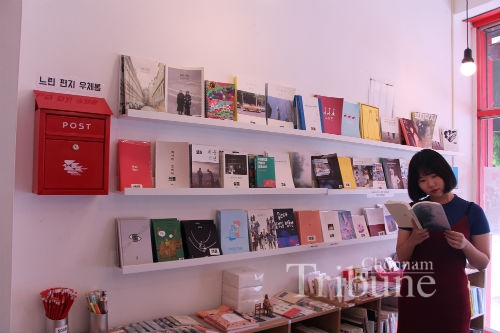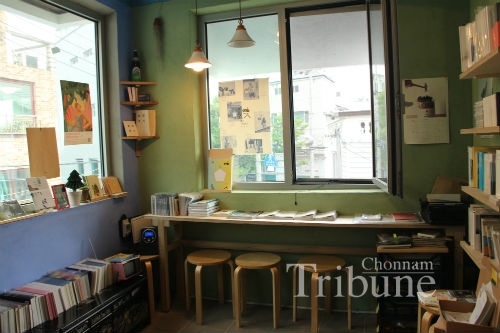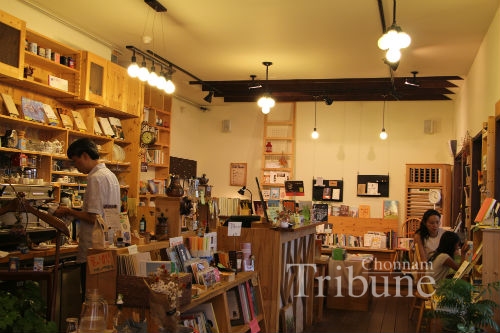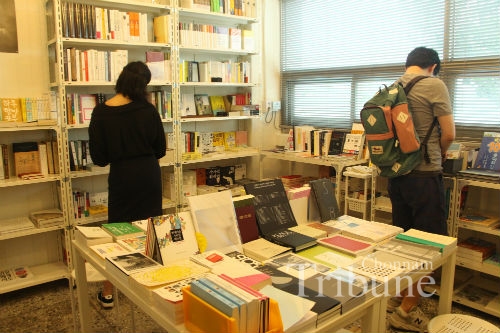새로운 문화 공간, 동네서점

Today’s bookstores have become cultural venues for local residents, not just a place to buy a book a nymore. It is not a thing of the past to make a trip to bookstores. A number of people used to visit bookstores around their neighborhood of residence to buy books but nowadays people prefer buying books online and reading e-books with electronic devices. Such book buying and reading habits make independently owned and small bookstores face a serious economic crisis. They have to seek sustainable solutions to the crisis competing with large bookshops in the book market. The alternative way they need is to play a new role in local communities as a cultural space and a resting place in a city. Their remarkable change is a boon to local residents. The Chonnam Tribune recommends small but unique bookshops to promote reading culture in Gwangju.

Independent Book Stores
PajongMojong (sowing and transplanting) has a variety of independent books and provides self-publishing services. Owner Yang ji-ae said, “When I prepared to join a publishing company before operating this bookstore, I knew Gwangju had few independent book stores. I simply thought it would be good if there was an independent book store that local community members could easily visit. Eventually, I opened this store for selling and publishing independent books.” It respects customers’ personal taste and sells books with personal stories about small moments. There are so many travelogue books that people wrote down their feelings in while traveling. She is preparing to publish a book someone wants to read or buy right away and to hold an independent book festival with other independent book stores in the city. The festival is scheduled around September this year.
Younji (pencils and erasers) Bookstore sells independent books and used university textbooks on commission. Students can sell their used textbooks easily paying a commission of 30 percent on sales to this bookstore. It is managed by a university student majoring in fine arts. Owner Min Hee-jin, “I started this bookstore to sell customers’ books published by my self-publishing company, Younjibook. Now I’m trying to make it an alternative cultural space for local residents by providing diverse services.” Younji Bookstore also has many kinds of cute stuff that the owner picks out by herself. There are dried flowers, postcards, fortune cookies and various stationeries. Furthermore, it provides some events and services for visitors. It has a “small room exhibition” where anyone who would like to share their works can exhibit them. It provides a Polaroid-style photo printing service and a ‘slow mailbox’ for people who want bring back their memories. Visitors can write and put a letter into the slow mailbox and derive simple but memorable pleasures from it.

Bookstore Café
Su:m (breath) is a bookstore with a café and a library. Customers can have a good time and read books in a cozy and comfortable atmosphere while buying a book. This bookstore operates a library where school parents have a book club meeting every week and their children study and read books. It hosts many events to boost reading culture among local residents. If you buy a book published by Dolbaege publishing company and post the picture of the book on the company’s SNS, you can get a book gift. If you become a Su:m member, you can get some benefits like receiving a discount on books, drinks and so on. Owner Ahn Seok said, “Local residents are likely to read books more and more after changing the bookstore into a bookstore café with a library. It is amazing!”
This bookstore café has special features that its owner is very interested in, such as community culture and actively getting involved in community-related activities in our region. It has various kinds of magazines and newsletters about Jeolla-do. It has a space to commemorate the May 18 Gwangju Democratization Movement, the May 18-related books and a board game named ‘Defend Jeollanam-do Provincial Office Building’. The bookstore also has a memorial place for the 2014 Sewol ferry disaster decorated with books and goods while also holding events of making yellow Sewol ribbons once a week. This bookshop is quite concerned about these memorial spaces in order to ensure that the May 18 and the Sewol ferry disaster are not forgotten.

Specialty Bookstore
Chaek & Saenghawl (books and life) is a specialty bookstore for humanities and arts managed by three owners. They usually select their favorite books respectively and display them on the bookshelves according to the publication date. In this bookstore, owners recommend books to customers, and customers also recommend their favorite books. Owner Shin Heon-chang said, “It is difficult to select books, but our customers motivate me to do it.“ He recommended a book titled “We Need Language” composed of real dialogues about gender discrimination in daily life. It became Chaek & Saenghawl’s bestseller and it has sold over 50 copies in less than a month. Its publishing company started to sell it in local bookstores in order to foster local small bookshops. Actually, they have been encouraged by this kind of support, although they have difficulty surviving in the book market competing with large bookstore chains and online bookstores.
This bookshop has a plan to publish a map showing the location of current bookstores and closed bookstores and introducing cultural programs in Gwangju, as a way to promote local bookshops and the reading culture in the city. The owner said that the most difficult thing is that few people visit this bookshop but he would continue to make an effort to cultivate the reading culture and to promote local bookstores. He hopes that Chaek & Saenghawl is known to many people and that they feel free to visit it. He also hopes that it is a place where everyone can relax in a no-cost way.
Turning Crisis into Opportunity
Many people nowadays do not read books although they recognize the importance of reading. According to the biannual survey results released by the Ministry of Culture, Sports and Tourism, adult Koreans read less than 11 books on average in 2015. In this situation, large bookstore chains and online bookstores have tried to change the way that they sell books. They even offer books with the lowest prices. It has caused independent bookstores’ to enter a financial crisis, and many of them have closed and been displaced by grand bookstores like Kyobo Bookstore. However, local independent bookshops have been turning the crisis into opportunities.
Now they have changed to a new kind of bookshop different from the original ones and plan to perform cultural projects. The reason is that they discovered their particular strength. That is communication with local residents. They have interactive and customer-oriented features and have become cultural spaces for local residents. At the bookstores, local residents can make a trip to the world of books to satisfy their personal taste and publish their own books. In these ways, the newly changed bookstores will be alternative cultural spaces for local communities.
By Kim Yu-na, Student Editor
Lee Kyeong-ryun, Tribune Reporter

